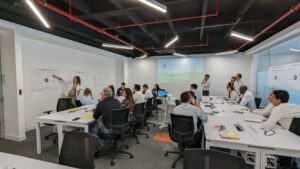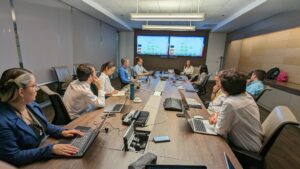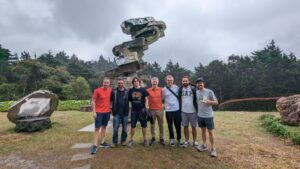The Importance of Understanding Local Context; Insights from a Colombian Engagement
Marketing

The blog discusses a five-day engagement by the Satellite Applications Catapult team working with project partners to explore the needs of the people in the Urabá region of Antioquia, Colombia for improved connectivity as a part of the UK Government funded project ‘Rural Connected Colombia’. The Satellite Applications Catapult team was led by experts from the User Centred Design and Business Strategy teams, and they were joined by project partners from AgriTIERRA, OXI Consultoria (OXI Consulting) and Fundación Grupo Bancolombia (Bancolombia) as a part of the project team.
During the visit, the project team had a chance to experience the local context by taking a tour of the target area and meeting with various stakeholders, regional associations, banana, cacao, and palm oil farmers, the new Port of Antioquia, and a local university. The trip was primarily focused on understanding the connectivity needs of the area and exploring the minimum requirements for connectivity that would align with the bank’s philanthropic and social inclusion work. By providing the right connectivity to users in these rural areas, the next phase of project can bring significant benefits to the region, including improved access to education, healthcare, financial inclusion, and economic opportunities.
The blog emphasizes the importance of understanding the local context to gain a deeper understanding of the area and the specific needs for connectivity. By working closely with local communities and businesses, the government can ensure that the investments it makes in improving connectivity have a meaningful and positive impact on the region.
Rural Connected Colombia Project
The project aims to develop and demonstrate the use of satellite technology to connect rural areas in Colombia with reliable and affordable broadband internet. This will help bridge the digital divide in Colombia, where many rural areas lack access to high-speed internet, and support the country’s economic and social development goals.
For more information about the project click here >>
Land of Opportunity

The journey began in Medellin (the capital of Colombia’s mountainous Antioquia province). The city of Medellin has undergone significant transformation in recent years, emerging as a leading hub of innovation and entrepreneurship in Latin America. One of the key drivers of this transformation has been the Medellin Innovation District, which brings together entrepreneurs, companies, and institutions to create a dynamic innovation ecosystem specialising in Industry 4.0 technologies such as artificial intelligence, the Internet of Things, and blockchain. Medellin has fast become a leading hub for emerging technologies and cutting-edge innovation with corporates such as Bancolombia harnessing and supporting this talent to tackle regional and national challenges.
Overall, Medellin’s transformation into an innovation hub is a testament to the hard work and dedication of its people, as well as the city’s commitment to investing in education, infrastructure, and technology. With continued investment and collaboration, Medellin is poised to remain at the forefront of innovation and entrepreneurship in Latin America, driving economic growth and improving the lives of its citizens.
The project team then moved to our focus area for the project, Urabá which is a region located in the northwest of Antioquia in Colombia with a rich history and potential for economic development. For many years, the region faced significant challenges, including violence, displacement, and poverty. However, following the agreed peace treaty in 2016, recent years have seen significant progress in addressing these issues and promoting economic growth in the region. Urabá has a strong agricultural sector, with the production of crops such as bananas, plantains, and palm oil. The region has also made significant progress in improving infrastructure, including the construction of new ports and major road infrastructure. These developments are helping to turn the region into a major trade hub promoting economic growth and creating opportunities for local businesses.
While there have been challenges in the past, the people of Urabá have shown resilience and determination in building a brighter future for their region. With continued investment in infrastructure, education, and workforce development, Urabá has the potential to become a leading logistics and agricultural hub in Colombia and the wider region. The recent progress made in the region is a testament to the hard work and dedication of the people of Urabá, and there is every reason to be optimistic about the future of this vibrant and dynamic region.
Understanding the needs of Colombian users
In Medellin the project team was stationed at Bancolombia’s headquarters, where they collaborated with project partners to gain insights into the connectivity needs of different users including the requirements of lead client Bancolombia and their pillars of financial inclusion, competitiveness of the productive base, and sustainable cities and communities, all of which are aligned with UN Sustainable Development goals. During their visit, the project team arranged meetings with diverse stakeholders and potential business partners from around Colombia who could assist in the development of the infrastructure project in the region.

A key component of the visit was to hold a workshop with regional and national stakeholders focused on how improved connectivity would benefit sectors such as finance and agriculture in the region and how sustainable business models can be delivered leveraging knowledge gained across UK projects such as 5G RuralDorset. The team also learned about the potential for collaboration with other universities and research institutions around the world, which would be enabled with better internet access.
Following workshops and meetings in Medellin with key stakeholders, the project team undertook a two-day tour of focus locations within the Urabá region led by Bancolombia. While touring the region, the team paid attention to social cues such as average income, housing, types of phones and cars used, and societal values. These finer details helped them gain a better understanding of the region’s specific needs for connectivity and develop a more effective business model. By providing connectivity to rural areas, the project would bring significant benefits to the region, including improved access to education, healthcare, and economic opportunities.

During the visit, the team held several meetings with local stakeholders to understand the impact of improved connectivity in the region including various communities and businesses. These meetings included representatives from large banana plantations to smaller cocoa, palm plantations and also a local university. The aim was to discuss the advantages of improved connectivity for the region and to learn about the specific needs and challenges of these stakeholders. The team also visited various small towns to understand the banking system operated by Bancolombia, and meetings with regional development authorities, chamber of commercial, the port of Antioquia and more.
The tour underscored the challenges caused by the region’s lack of connectivity and showcased the potential impact of improved connectivity on the local economy and quality of life. This visit was vital because it enabled the team to hear directly from stakeholders in the region about their needs and challenges and collaborate to identify solutions that would benefit everyone. By working closely with local communities and businesses, the government can ensure that the investments they make in improving connectivity have a significant and positive impact on the region. The lack of connectivity has also held back startups that are bringing innovative and sophisticated technologies such as crop sensing equipment, production trackers or transport solutions to the local environment.
When team met with the local university – Universidad de Antioquia, they discussed the benefits of improved connectivity for students and faculty. It would provide access to a wealth of educational resources online and enable collaboration with other universities and research institutions worldwide. The university already offers online programs, but many students must travel long distances to access the internet, which could be avoided if connectivity were available locally. Currently the packages are only accessed remotely by those that live close to connected areas.
During discussions with locals, the team learned that people in the region want to use their mobile phones and stay in touch with family and friends. They haven’t been able to connect with loved ones who moved away, and they want connectivity for their children’s education or to chat with others online.
Leveraging UK knowledge
A critical component of the project is to showcase and share learnings of relevant connectivity initiatives undertaken in the UK with our Colombian audience. In the UK, there has been a growing interest in the use of next generation connectivity (e.g. 5G technology) to support urban and rural economic growth across sectors such as agriculture where traditional connectivity options may be limited. The 5G RuralDorset project is a prime example of this demonstrating how 5G can be used to support precision farming, environmental monitoring, and other agricultural applications. In Urabá similar challenges exist in terms of connectivity and sustainable agriculture. While the specific technologies and infrastructure needed may differ, there is certainly potential for innovation and collaboration to support more efficient and sustainable agricultural practices. The region’s strong agricultural sector, combined with government investment in infrastructure and economic development, could create opportunities for partnerships and collaboration with businesses, universities, and other institutions to drive innovation and support sustainable growth.
Next Steps for the Rural Colombia Project
The team at Satellite Applications Catapult realised the significance of grasping the local context, which will enable them to design a more practical and feasible service. They acquired invaluable insights by immersing themselves in the country, including its business models, social cues, and local context. This Colombian engagement emphasized the criticality of comprehending the local context and integrating it into a service, especially when deploying remote solutions in regions with restricted connectivity.
Peter Swanton, the Senior Designer Thinker emphasized the significance of their trip, stating that “being in the country provided them with invaluable information that they would not have obtained otherwise. We were able to narrow down user requirements from key stakeholders such as banks, potential users, and partners. As a user-centred designer, my role is to engage with various stakeholders and understand their different desires, drivers, and needs for the project.”
Tom Donnelly, Business Strategy Consultant added that “one of the most crucial benefits of the trip was seeing Bancolombia’s commitment to the project. I am optimistic about their commitment, based on the seniority and commitment of the individuals we met. I am also impressed with Colombia’s tax mechanism, known as ‘Obras por impuestos,’ which has the potential to fund the project across the entire country.”
Mark Jarman, CEO of AgriTIERRA remarked “For initiatives such as the Rural Connected Colombia project to be successful and for the attainable impact to be realised, it is essential to operate locally and to build the links and knowledge through engagement with local stakeholders. Operating between UK and LATAM markets, AgriTIERRA have been well placed to collaborate with the Catapult and to help the Catapult team understand the Colombian environment and different user needs. We are excited to move towards Phase 2 implementation activities knowing the right solutions will be designed and delivered”.
Statement from Bancolombia: “Being part of the Rural Connected Colombia project broadens our perspective on how to enable rural connectivity for financial inclusion in rural areas. We are enthusiastic and committed with the taxes mechanism to boost investment for infrastructure and connectivity in territories with great potential, such as Urabá. Meeting the Catapult team, joining AgriTierra and the rest of stakeholders made us realized we can connect knowledge, experience, resources, enterprises, and institutions to create sustainable solutions with social impact.”
The next steps for the Rural Colombia project are to continue knowledge exchange and welcome Colombian delegation to the UK in just few weeks. Phase 1 aims to create a roadmap for Phase 2, which is necessary for implementing and rolling out the technology. This roadmap includes specifying systems locations, equipment procurement costs, timelines, partners and service models, and business plans.





